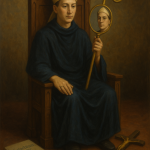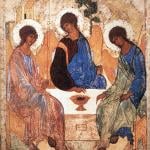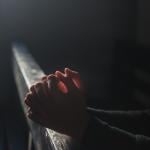Last updated on: December 13, 2014 at 4:26 pm
By
CNA Daily News
Vatican City, Dec 13, 2014 / 09:26 am (CNA/EWTN News).- In an audience with people who are blind and visually impaired Pope Francis said that St. Lucy’s courage in facing martyrdom can teach them to live their disability without fear or isolation. “Lucy suggests to us a value which for me seems very important also for you: courage,” the Pope told members of the Italian Union of the Blind and Visually Impaired on Dec. 13. “She was a young woman, helpless, but confronted torture and violent death with great courage, a courage which came from the risen Christ, with whom she was united, and from the Holy Spirit, who lived within her.” In his speech the pontiff recognized how his audience with the group fell on the feast day of St. Lucy, who lived in Italy during the third century and is the patroness of the blind and visually impaired. Although this might not be well-known to all members of the group since it is a non-denominational association, the Pope explained that it has great significance for each of them, particularly in terms of human values. Lucy was able to live in an exemplary way due to her faith in Christ, he noted, but recognized that the values she espoused can be shared by all. One of the key values St. Lucy teaches is courage, he said, observing how “all of us need courage to face life's trials. In particular people who are blind and visually impaired have the need not to close themselves, not to take on an attitude of victimization.” Rather, persons with such disabilities need “to open themselves to reality, to others, to society; to learn to know and appreciate the capacity the Lord has placed in each one, in all, without exception! But this requires courage, strength of spirit,” he said. Pope Francis then emphasized the importance of community, noting how Lucy was not alone, but was a member of the universal Church of which Christ is the head and foundation. In being an association, the group also has this same quality of community, the Bishop of Rome said, explaining that an association is more than a mere collection of individuals. “Today there is a great need to live with joy and commitment the associative dimension, because in this historic moment its ‘in decline,’ it’s not strongly felt,” he noted, observing how the ability to form a group, to be in solidarity with others and to pool each other’s resources are all part of a group’s civil heritage. People living with disadvantages or disabilities can, often through their own personal experience, show the world that human beings are not “monads,” the Pope said. “We are not made to be isolated, but to relate, to complement one another, to help each other, to accompany, sustain and support each other,” he observed, noting that the presence of people with disabilities “causes everyone to make a community, indeed to be a community” despite our limitations. “Because we are all capable, but we all have limits too!” the Roman Pontiff noted. He then returned to the life of St. Lucy, saying that another key value she teaches is that life is made to be given. Although she lived this value to the “extreme” through martyrdom, it is a universal quality, the Pope explained, noting that it is also the key to true happiness. “Man is not fully realized in having or even doing; he is realized in loving, that is, in giving,” he said, and pointed out how the name “Lucy” means “light.” Each person becomes light to the extent in which they are a gift to others, the Pope noted, observing that “each person, in reality, is this – is a precious gift.” The pontiff noted how living according to these values can create certain misunderstandings because they go against the times in a culture that places a heavy emphasis on individual rights. “So there is still a need to fight, with the example and intercession of St. Lucy! I hope that you to do so with courage, and with the joy of doing it together!” Read more















